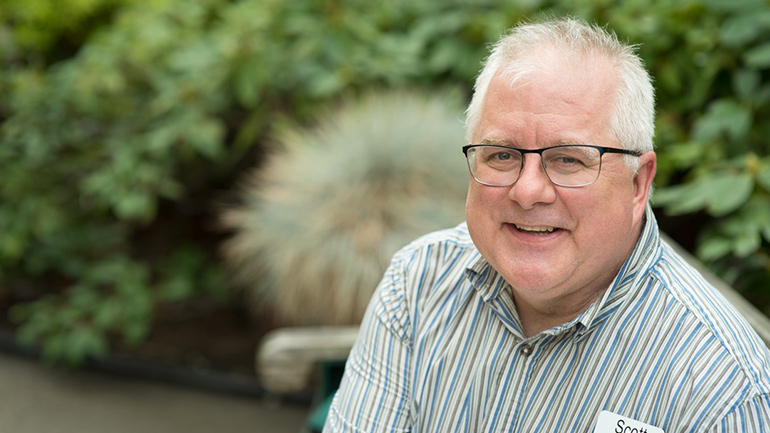
When a person moves to a long-term care facility, it is because they can no longer live independently at home due to their health care needs.
This can be a difficult transition for many reasons, including feelings of lost independence, anxiety about change and caregiver burnout.
“Residents and families who come into long-term care facilities are often in a state of crisis,” Social Worker Scott Stewart explains. “Whether it’s because of a physical, medical or cognitive decline, individuals who find themselves here sometimes haven’t really planned for it.”
As a social worker at Queens Park Care Centre, Scott offers counselling and support to help residents and family members through this transition.
“My goal is to help navigate people into a safe spot, to reassure them they are going to be OK and things will get better with the right support,” he says. “My hope is that people leave my office feeling comforted, supported and reassured.”
Scott began working as a social worker in long-term care facilities in 1995 and moved to Queens Park Care Centre six years ago.
“Scott’s kind, friendly nature and unwavering belief that residents’ values and wishes are central to their health care is what makes him exceptional,” says Dr. Nicholas Petropolis, family physician who works with Scott at the care centre.
One example of this was when a man became a resident at the centre after a prolonged hospital stay. Over time he became healthier and expressed he wanted to move home again, something that is not common for long-term care. Scott advocated for the resident and walked alongside him as he worked through the challenging process of proving his capabilities and finding a safe home to live. “When others might say ‘that can’t be done’, Scott says ‘why not?’ To see the joy on that resident’s face when he was told he could go to his new home was something I will never forget,” says Dr. Petropolis.
Scott is an example of doing small things with great care. When he spoke with some younger residents with physical disabilities who expressed interest in attending a sporting event, he took the initiative to write to the BC Lions and the Vancouver Canadians baseball team. The residents were thrilled to receive complimentary tickets to attend.
“Every day when we come to work, we have the opportunity to do small things that might not be that hard for us, but they can make a lasting impact on the people we serve,” Scott says.
A few years ago, when Scott learned a married resident couple were celebrating their anniversary, he wanted to find a way for them to celebrate together. He asked his team to set up a table with flowers while he went out to buy the couple’s favourite take-out meals. This became an annual tradition for the couple who had no other family.
“Our residents are someone’s mothers, fathers, children,” Scott says. “We owe it to them to not let them fall through the cracks or be forgotten.”
Scott is the recipient of this year’s Above and Beyond Fraser Health Hero Award. He insists though that he is no hero. “My team are the heroes that I work with every day,” he says. “I couldn’t do what I do without them.”
